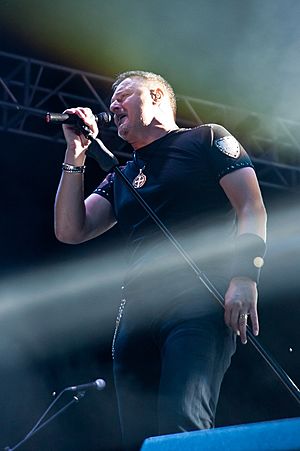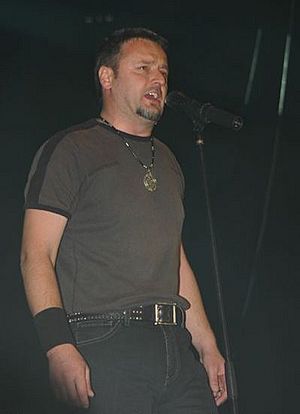Marko Perković facts for kids
Quick facts for kids
Marko Perković
|
|
|---|---|

Perković performing live in August 2013
|
|
| Born | 27 October 1966 Čavoglave, SR Croatia, Yugoslavia
|
| Nationality | Croatian |
| Occupation | Singer-songwriter |
| Years active | 1991–present |
| Spouse(s) |
|
| Children | 5 |
| Musical career | |
| Genres |
|
| Instruments | Vocals |
| Labels | Croatia Records |
Marko Perković (born October 27, 1966) is a famous Croatian musician. He is best known as the lead singer of the band Thompson, which he started in 1991.
Perković was born in a village called Čavoglave in what was then Yugoslavia, and is now part of Croatia. He took part in the Croatian War of Independence (1991–1995). During this time, he began his music career with a patriotic song called "Bojna Čavoglave".
In 2002, he started his first big music tour after releasing his album E, moj narode. Since 2005, he has helped organize a special event in his hometown of Čavoglave to celebrate Victory Day.
Throughout his career, some of Perković's performances and songs have caused discussion and debate. Some people have said that certain songs or actions at his concerts remind them of a difficult time in Croatian history during World War II.
Contents
Early Life and War Experience
Marko Perković was born in 1966 in Čavoglave. His parents were Marija and Ante. He didn't see his father very often because his father worked in Germany. Marko finished high school in Split.
In 1991, Croatia became independent from Yugoslavia. This led to the Croatian War of Independence. Perković joined the Croatian forces to defend his home. During the war, he used a type of gun called a Thompson submachine gun. This gun became his nickname and later, the name of his band.
While defending his village, Perković was inspired to write "Bojna Čavoglave" (meaning Čavoglave Battalion). This song became very popular during the war and helped start his music career. In 1992, Perković performed concerts across Croatia and released his first music album. He continued to write songs during the war. In 1995, he rejoined the Croatian Army. He was one of the first soldiers to enter the cities of Drniš and Knin after they were taken back during a military action called Operation Storm.
Music Career and Public Attention
After the war, the band Thompson became less popular for a while. However, in 2002, their popularity grew again. This happened as Perković connected with people who were critical of the Croatian government at the time. These people were protesting the government's cooperation with an international court that dealt with war-related issues.
On September 15, 2002, Perković had his biggest concert up to that point. It was held at the Poljud Stadium in Split, and about 40,000 people attended.
In 2007, he had an even larger concert at the Maksimir Stadium in Zagreb on June 17. About 60,000 people came to this concert. The concert was shown live on a special TV channel and later on the main national channel.
Perković has mentioned that other musicians like Mate Bulić, Nightwish, Iron Maiden, AC/DC, and Dream Theater have influenced his music.
In 2009, a concert in Lucerne, Switzerland, was canceled. This happened after a political party raised concerns about the concert. They called Perković a "fascist." He was then temporarily not allowed to perform in Switzerland. This was because a Swiss agency said some of his song lyrics seemed to support a controversial group from World War II in Croatia. However, the ban was later lifted, and he was able to perform in Switzerland again.
The words in Perković's songs often talk about patriotism, religion, family, the Croatian War of Independence, and current events. Some of his songs have also caused controversy because of their historical references. In 2004, his band was not allowed to perform in Amsterdam by local authorities, though he did have a concert in Rotterdam.
Because Switzerland is part of the Schengen Agreement (which allows people to travel freely between many European countries), Perković was temporarily not allowed to enter many Schengen countries for three years.
Perković has faced criticism for allegedly performing a song called "Jasenovac i Gradiška Stara." This song is seen by some as openly supporting the controversial World War II regime and its actions. The Simon Wiesenthal Centre complained to Croatia's state television about showing a singer accused of having ties to this past. Perković has said he did not write or perform this specific song. He stated that he is "a musician, not a politician."
Some of his fans have been seen wearing symbols and banners that relate to the controversial World War II group. At the start of his song "Bojna Čavoglave," Perković uses the phrase Za dom - spremni! (meaning "For home (land) – ready!"). This phrase is also linked to the controversial group from World War II. In 2015, Perković performed in Knin for the 20th anniversary of Operation Storm. Around 80,000 people attended, and some were heard singing songs and chanting slogans that supported the controversial group.
Perković and his band's involvement in Croatia's celebration of the national football team's second-place finish in the 2018 FIFA World Cup also led to some debate and criticism.
Because of the alleged support for the controversial World War II group, some publications, including the Simon Wiesenthal Center, have called Perković a "fascist singer."
Personal Life
In the mid-1990s, Marko Perković was in a relationship with Croatian singer Danijela Martinović. They had a Catholic marriage ceremony. After they separated, he sought a Church annulment, which was granted in 2005. This allowed him to have a church marriage with his current wife, Sandra Rogić. Sandra is Croatian-Canadian, and they met during a concert in Canada. They have five children together: Katarina, Cvita, Ante Mihael, Diva Maria, and Petar Šimun.
Perković owns a part of a radio station called Narodni radio. This is a private Croatian radio station known for playing only Croatian songs.
In December 2009, Pope Benedict XVI met with Perković.
Discography
Studio Albums
- 1992 – Moli mala
- 1995 – Vrijeme škorpiona
- 1996 – Geni kameni
- 1998 – Vjetar s Dinare
- 2002 – E, moj narode
- 2006 – Bilo jednom u Hrvatskoj
- 2011 – Glazba iz filma Josef
- 2013 – Ora et labora
Compilation Albums
- 2001 – The best of
- 2003 – Sve najbolje
- 2008 – Druga strana
- 2015 – The best of collection
- 2016 – Antologija
Concert Videos
- 2002 – Turneja: E, moj narode
- 2007 – Turneja: Bilo jednom u Hrvatskoj
- 2013 – Turneja: Ora et labora
Images for kids
See also
 In Spanish: Marko Perkovic "Thompson" para niños
In Spanish: Marko Perkovic "Thompson" para niños
 | Bayard Rustin |
 | Jeannette Carter |
 | Jeremiah A. Brown |



